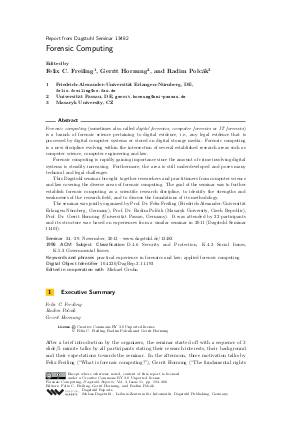Forensic Computing (Dagstuhl Seminar 13482)
Authors Felix C. Freiling, Gerrit Hornung, Radim Polcák and all authors of the abstracts in this report
-
Part of:
Issue:
Dagstuhl Reports, Volume 3, Issue 11
Part of: Volume: Dagstuhl Reports, Volume 3
Part of: Journal: Dagstuhl Reports (DagRep) - License:
 Creative Commons Attribution 3.0 Unported license
Creative Commons Attribution 3.0 Unported license
- Publication Date: 2014-03-21
File

PDF
DagRep.3.11.193.pdf
- Filesize: 0.65 MB
- 16 pages
Document Identifiers
Subject Classification
Keywords
- practical experience in forensics and law; applied forensic computing
Metrics
- Access Statistics
-
Total Accesses (updated on a weekly basis)
0Document
0Metadata
Abstract
Forensic computing} (sometimes also called digital forensics, computer forensics or IT forensics) is a branch of forensic science pertaining to digital evidence, i.e., any legal evidence that is processed by digital computer systems or stored on digital storage media. Forensic computing is a new discipline evolving within the intersection of several established research areas such as computer science, computer engineering and law. Forensic computing is rapidly gaining importance since the amount of crime involving digital systems is steadily increasing. Furthermore, the area is still underdeveloped and poses many technical and legal challenges. This Dagstuhl seminar brought together researchers and practitioners from computer science and law covering the diverse areas of forensic computing. The goal of the seminar was to further establish forensic computing as a scientific research discipline, to identify the strengths and weaknesses of the research field, and to discuss the foundations of its methodology. The seminar was jointly organized by Prof.Dr. Felix Freiling (Friedrich-Alexander-Universität Erlangen-Nürnberg, Germany), Prof.Dr. Radim Polcák (Masaryk University, Czech Republic), Prof.Dr. Gerrit Hornung (Universität Passau, Germany). It was attended by 22 participants and its structure was based on experiences from a similar seminar in 2011 (Dagstuhl Seminar 11401).
Cite As Get BibTex
Felix C. Freiling, Gerrit Hornung, and Radim Polcák. Forensic Computing (Dagstuhl Seminar 13482). In Dagstuhl Reports, Volume 3, Issue 11, pp. 193-208, Schloss Dagstuhl – Leibniz-Zentrum für Informatik (2014)
https://doi.org/10.4230/DagRep.3.11.193
BibTex
@Article{freiling_et_al:DagRep.3.11.193,
author = {Freiling, Felix C. and Hornung, Gerrit and Polc\'{a}k, Radim},
title = {{Forensic Computing (Dagstuhl Seminar 13482)}},
pages = {193--208},
journal = {Dagstuhl Reports},
ISSN = {2192-5283},
year = {2014},
volume = {3},
number = {11},
editor = {Freiling, Felix C. and Hornung, Gerrit and Polc\'{a}k, Radim},
publisher = {Schloss Dagstuhl -- Leibniz-Zentrum f{\"u}r Informatik},
address = {Dagstuhl, Germany},
URL = {https://drops.dagstuhl.de/entities/document/10.4230/DagRep.3.11.193},
URN = {urn:nbn:de:0030-drops-44426},
doi = {10.4230/DagRep.3.11.193},
annote = {Keywords: practical experience in forensics and law; applied forensic computing}
}
